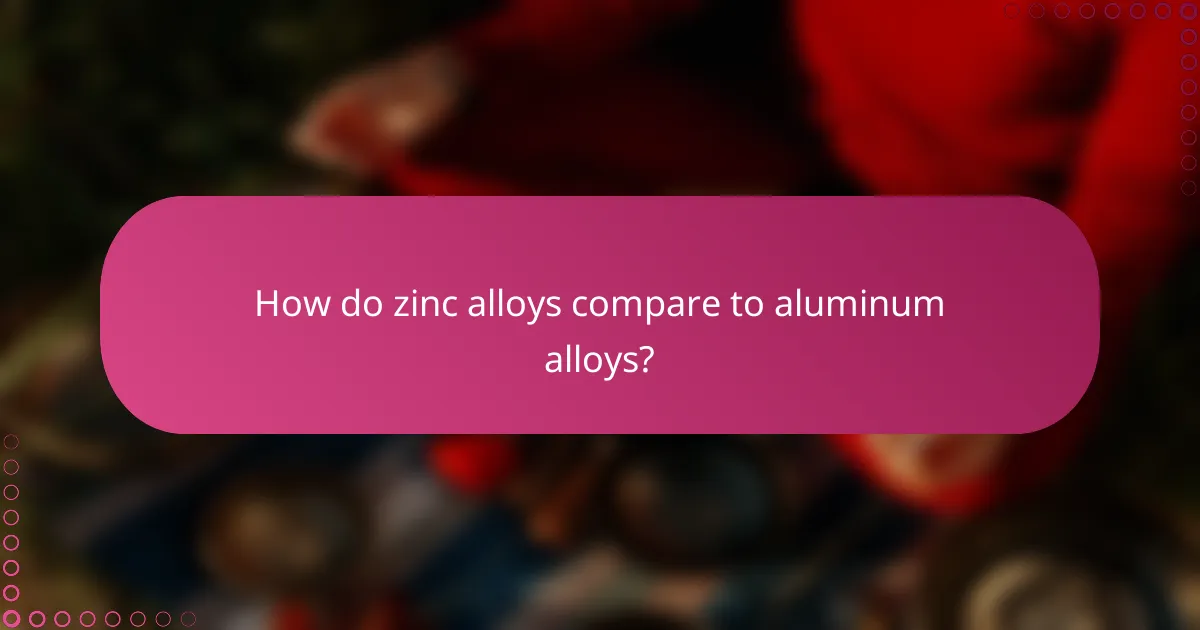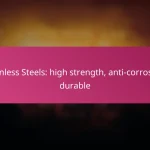Zinc alloys are highly valued in manufacturing for their exceptional corrosion resistance, lightweight nature, and excellent casting properties. These characteristics make them ideal for a variety of applications, particularly in industries like aerospace, automotive, and construction, where durability and efficiency are paramount.

What are the benefits of zinc alloys in manufacturing?
Zinc alloys offer several advantages in manufacturing, including excellent corrosion resistance, lightweight properties, and good casting characteristics. These benefits make them suitable for various applications, particularly in industries where durability and efficiency are crucial.
Corrosion resistance
Zinc alloys are known for their remarkable corrosion resistance, which is primarily due to the protective zinc oxide layer that forms on their surface. This layer acts as a barrier against moisture and environmental factors, significantly extending the lifespan of components made from these alloys.
In practical terms, zinc alloys can withstand harsh conditions, making them ideal for outdoor applications, automotive parts, and marine environments. This resistance can reduce maintenance costs and improve overall reliability.
Lightweight properties
One of the standout features of zinc alloys is their lightweight nature, which is advantageous in applications where weight reduction is essential. Compared to other metals, zinc alloys are significantly lighter, allowing for easier handling and transportation.
This lightweight property contributes to improved fuel efficiency in vehicles and reduced energy consumption in manufacturing processes. For example, using zinc alloys in automotive components can lead to better performance and lower emissions.
Good casting characteristics
Zinc alloys exhibit excellent casting characteristics, enabling manufacturers to create intricate shapes and designs with high precision. The alloys can be easily cast into complex geometries, which is beneficial for producing detailed components.
Moreover, the low melting point of zinc alloys allows for efficient casting processes, reducing energy consumption and production time. This makes them a preferred choice for high-volume production runs where quality and consistency are paramount.

How do zinc alloys compare to aluminum alloys?
Zinc alloys and aluminum alloys serve different purposes, with each offering unique advantages. Zinc alloys are generally more corrosion-resistant and have good casting properties, while aluminum alloys are lighter and often used in applications requiring higher strength-to-weight ratios.
Weight comparison
Aluminum alloys are typically lighter than zinc alloys, making them a preferred choice in applications where weight is critical, such as in aerospace and automotive industries. Zinc alloys, while heavier, provide a balance of weight and strength, which can be beneficial in certain structural applications.
For instance, aluminum alloys can weigh around 2.5 g/cm³, whereas zinc alloys usually range from 6.5 to 7.5 g/cm³. This significant difference in density affects the overall design and material selection for specific projects.
Corrosion resistance comparison
Zinc alloys are known for their excellent corrosion resistance, often outperforming aluminum alloys in harsh environments. This property makes zinc alloys suitable for outdoor applications and in industries where exposure to moisture and chemicals is common.
In contrast, aluminum alloys can corrode under certain conditions, particularly in saline environments. However, aluminum can be treated with coatings or anodizing to enhance its corrosion resistance, although this may add to the overall cost.
Cost-effectiveness
When considering cost-effectiveness, zinc alloys are generally less expensive than aluminum alloys, making them an attractive option for budget-conscious projects. The lower material cost can lead to significant savings, especially in large-scale manufacturing.
However, the choice between these alloys should also factor in the total lifecycle cost, including maintenance and durability. In applications where longevity and performance are critical, investing in aluminum may yield better long-term value despite the higher initial cost.

What industries use zinc alloys?
Zinc alloys are widely utilized across various industries due to their corrosion resistance, lightweight properties, and excellent casting characteristics. Key sectors include aerospace, automotive, and construction, where these alloys provide both functional and economic advantages.
Aerospace applications
In the aerospace industry, zinc alloys are valued for their lightweight nature and strength, which contribute to fuel efficiency and performance. Components such as brackets, housings, and other structural elements often incorporate zinc alloys to reduce weight without sacrificing durability.
Manufacturers must consider the specific alloy composition to meet stringent aerospace standards, ensuring that parts can withstand extreme conditions. Commonly used alloys include those that combine zinc with aluminum and copper for enhanced mechanical properties.
Automotive components
Zinc alloys play a significant role in automotive manufacturing, particularly in die-casting applications for parts like engine blocks, transmission housings, and decorative trim. Their resistance to corrosion makes them ideal for components exposed to harsh environments, such as those found in vehicles.
When selecting zinc alloys for automotive use, it is crucial to evaluate the alloy’s performance under varying temperatures and stress conditions. This ensures longevity and reliability in critical automotive applications.
Construction materials
In construction, zinc alloys are often used in roofing, gutters, and architectural features due to their durability and aesthetic appeal. They provide a long-lasting solution that resists weathering and corrosion, making them suitable for both residential and commercial buildings.
Contractors should consider the alloy’s properties, such as thermal expansion and resistance to environmental factors, to ensure optimal performance in construction applications. Using zinc alloys can lead to lower maintenance costs and extended lifespan for building materials.

How to select the right zinc alloy for your project?
Selecting the right zinc alloy involves understanding the specific requirements of your project, including environmental conditions, mechanical demands, and preferred casting methods. By evaluating these factors, you can choose an alloy that offers optimal corrosion resistance, mechanical strength, and casting performance.
Consider corrosion environment
The corrosion environment is a critical factor when selecting a zinc alloy. Different alloys exhibit varying levels of resistance to corrosion based on exposure to moisture, chemicals, and temperature fluctuations. For instance, alloys with higher aluminum content tend to perform better in aggressive environments, such as coastal areas or industrial settings.
When assessing the corrosion environment, consider the specific conditions your project will face. If the alloy will be exposed to saltwater or acidic substances, prioritize alloys known for their enhanced corrosion resistance, such as Zamak 3 or Zamak 5.
Evaluate mechanical properties
Mechanical properties, including tensile strength, ductility, and hardness, are essential for ensuring the alloy can withstand operational stresses. Zinc alloys generally offer good strength-to-weight ratios, making them suitable for lightweight applications. However, specific mechanical requirements may dictate the choice of alloy.
For example, if high tensile strength is necessary, consider alloys like Zamak 2, which provides superior mechanical performance compared to others. Always refer to the relevant standards for mechanical properties to ensure compliance with your project’s specifications.
Assess casting methods
The casting method you plan to use can significantly influence the choice of zinc alloy. Different alloys respond uniquely to various casting techniques, such as die casting or sand casting. For instance, alloys with lower melting points are often preferred for die casting due to their ease of flow and ability to fill intricate molds.
When selecting an alloy, evaluate the compatibility with your chosen casting method. For high-volume production, Zamak alloys are typically favored for their excellent fluidity and surface finish. Conversely, if you are working with complex shapes, consider alloys that allow for better detail reproduction in sand casting.

What are the common types of zinc alloys?
The common types of zinc alloys include zinc-aluminum, zinc-copper, and zinc-magnesium alloys. Each type offers distinct properties that make them suitable for various applications, particularly in terms of corrosion resistance, casting characteristics, and weight efficiency.
Zinc-aluminum alloys
Zinc-aluminum alloys are known for their excellent corrosion resistance and good casting properties. They typically contain around 4-12% aluminum, which enhances their mechanical strength and fluidity during casting.
These alloys are commonly used in die casting applications, such as automotive parts and household items. The addition of aluminum helps improve the alloy’s performance in harsh environments, making it a popular choice for outdoor applications.
Zinc-copper alloys
Zinc-copper alloys, often containing about 1-5% copper, are recognized for their improved strength and hardness compared to pure zinc. The copper content enhances the alloy’s wear resistance, making it suitable for components that experience friction.
These alloys are typically used in applications requiring high durability, such as in the manufacturing of gears and bearings. However, they may not offer the same level of corrosion resistance as zinc-aluminum alloys, so protective coatings are often recommended.
Zinc-magnesium alloys
Zinc-magnesium alloys incorporate magnesium to enhance strength and corrosion resistance. The magnesium content usually ranges from 0.5-3%, which significantly improves the alloy’s performance in marine and other corrosive environments.
These alloys are ideal for applications where weight reduction is critical, such as in aerospace and automotive industries. Their lightweight nature combined with good mechanical properties makes them a valuable option for manufacturers looking to optimize performance.

What are the future trends in zinc alloy development?
Future trends in zinc alloy development focus on enhancing corrosion resistance, improving casting properties, and reducing weight. Innovations in material science are driving these advancements, making zinc alloys more versatile for various applications.
Innovations in lightweight materials
Lightweight materials are becoming increasingly important in industries such as automotive and aerospace, where reducing weight can lead to improved fuel efficiency and performance. Zinc alloys, known for their lightweight properties, are being optimized to meet these demands.
Recent innovations include the development of high-strength zinc alloys that maintain structural integrity while being significantly lighter than traditional materials. These advancements allow for the creation of components that can withstand stress without adding unnecessary weight.
For practical applications, manufacturers are exploring the use of zinc alloys in components like die-cast parts, where the combination of low density and high durability is essential. This trend is expected to continue as industries seek to balance performance with sustainability.


